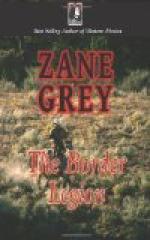The sun sank red and a ruddy twilight fell. It soon passed. Darkness had about set in when Roberts came over to Joan, carrying bread, coffee, and venison.
“Here’s your supper, Joan,” he called, quite loud and cheerily, and then he whispered: “Mebbe it ain’t so bad. They-all seem friendly. But I’m scared, Joan. If you jest wasn’t so dam’ handsome, or if only he hadn’t seen you!”
“Can’t we slip off in the dark?” she whispered in return.
“We might try. But it’d be no use if they mean bad. I can’t make up my mind yet what’s comin’ off. It’s all right for you to pretend you’re bashful. But don’t lose your nerve.”
Then he returned to the camp-fire. Joan was hungry. She ate and drank what had been given her, and that helped her to realize reality. And although dread abided with her, she grew curious. Almost she imagined she was fascinated by her predicament. She had always been an emotional girl of strong will and self-restraint. She had always longed for she knew not what—perhaps freedom. Certain places had haunted her. She had felt that something should have happened to her there. Yet nothing ever had happened. Certain books had obsessed her, even when a child, and often to her mother’s dismay; for these books had been of wild places and life on the sea, adventure, and bloodshed. It had always been said of her that she should have been a boy.
Night settled down black. A pale, narrow cloud, marked by a train of stars, extended across the dense blue sky. The wind moaned in the cedars and roared in the replenished camp-fire. Sparks flew away into the shadows. And on the puffs of smoke that blew toward her came the sweet, pungent odor of burning cedar. Coyotes barked off under the brush, and from away on the ridge drifted the dismal defiance of a wolf.
Camp-life was no new thing to Joan. She had crossed the plains in a wagon-train, that more than once had known the long-drawn yell of hostile Indians. She had prospected and hunted in the mountains with her uncle, weeks at a time. But never before this night had the wildness, the loneliness, been so vivid to her.
Roberts was on his knees, scouring his oven with wet sand. His big, shaggy head nodded in the firelight. He seemed pondering and thick and slow. There was a burden upon him. The man Bill and his companion lay back against stones and conversed low. Kells stood up in the light of the blaze. He had a pipe at which he took long pulls and then sent up clouds of smoke. There was nothing imposing in his build or striking in his face, at that distance; but it took no second look to see here was a man remarkably out of the ordinary. Some kind of power and intensity emanated from him. From time to time he appeared to glance in Joan’s direction; still, she could not be sure, for his eyes were but shadows. He had cast aside his coat. He wore a vest open all the way, and a checked soft shirt, with a black tie hanging untidily. A broad belt swung below his hip and in the holster was a heavy gun. That was a strange place to carry a gun, Joan thought. It looked awkward to her. When he walked it might swing round and bump against his leg. And he certainly would have to put it some other place when he rode.




